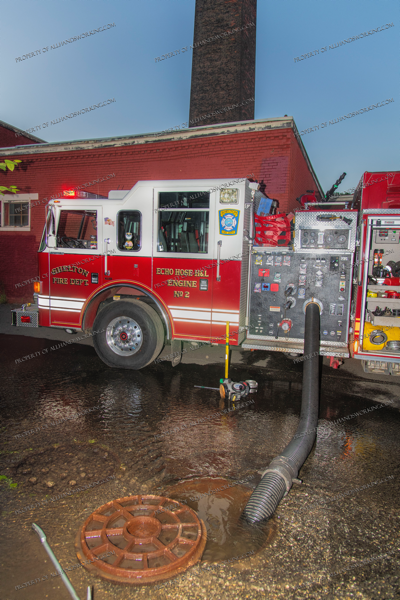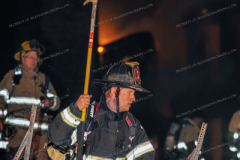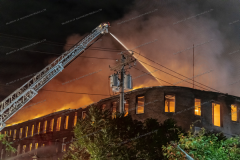06/13/20 Shelton, CT – Multiple departments in the valley battled this fire at the former Star Pin Company that consumed several multi-story, mill buildings.

The fire was reported shortly after 7 p.m. and by the time first-due companies arrived, they had a portion of the complex with heavy fire throughout. The fire quickly spread to the other buildings within the complex, followed by several structural collapses. Companies had access problems since the factory was built river side and there was only a narrow street where they could operate.

A heads up move by one of the Shelton MPOs involved drafting from the canal under the street through a manhole. Several ladders, multi-versals, and hand lines worked for hours to darken down the fire. It was not brought under control until eight hours later.

The buildings were built in 1875 and the company operated until 1975 making hair pins. The Star Pin Company was founded on September 25, 1866 and originally ten employees produced pins and hair pins within a 5,000 square foot, frame mill in the Wells Hollow section of Shelton. One of the founders and early officers of the company, James C. Hubbard, initially operated a pin shop in North Haven and is credited with inventing one of the first automated hair pin making machines in the United States. Hubbard’s son, Henry Franklin Hubbard, joined the company during the 1890s and was active with the firm for 57 years. During this time he attained the title of ‘dean of American pin makers,’ after designing the machine that produced the first bobby pins. The company’s early success caused it to outgrow its initial factory and in 1875 they erected a three-and-a-half-story, brick mill along the Housatonic Water Company’s recently constructed canal. This structure comprises the first three stories of the present complex’s central block. It was raised to four stories in 1906. By this time the firm employed over 125 workers. The company’s peak came during the 1920’s, whereupon 400 employees toiled within 125,000 feet of total floor space. By the early 1950’s, the company also produced folding paper boxes and grew to 140 employees. In 1973, a Hartford Courant article highlighted the fact that the Star Pin Company was one of the last firms in the state continuing to employ water powered generation, which it used to generate lighting. Following the closure of the Star Pin Company, its Canal Street plant passed to the Genie Manufacturing Company, a division of North American Philips.











